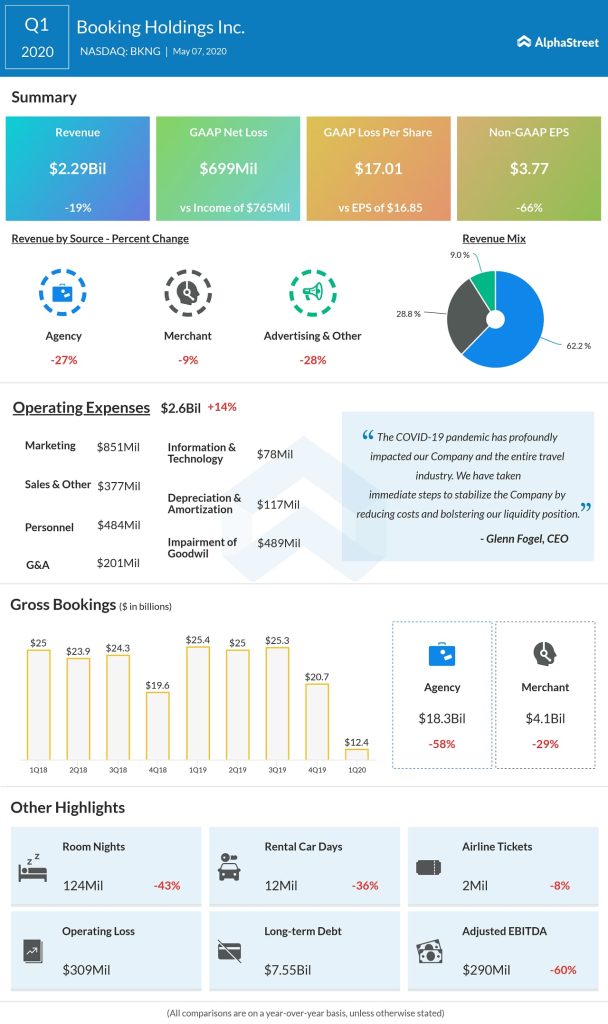So are we looking at more Thomas Cooks?
Thomas Cook got bankrupt about a year ago, much before COVID-19 wreaked havoc in the industry. Its customers were stranded in the middle of their trips as rescue talks failed to secure $250 million in contingency funding. Bookings were, as a result, canceled overnight. It showed as much as globalization has helped the travel industry, a little pinch could be very painful. Thomas Cook’s collapse was due to a spectrum of reasons: meteorological, political, financial and social.
[irp posts=”59756″]
Let’s take a look at the case of Booking Holdings (NASDAQ: BKNG). The company has a minority interest in companies such as Trip.Com Group, Meituan Dianping (a Chinese group buying website for food delivery, consumer products and retail services), Didi Chuxing, and Grab. Its balance sheet strength declines when the fair value of its investments dwindles due to the global disruption. When Booking Holdings reported its quarterly earnings recently, it increased allowances and reserves up to a total of $22 million in anticipation of cancellations and redemptions.
Most travel agencies depend highly on marketing and brand awareness. And presently, there seems to be a lot of competition from the suppliers’ end, such as hotels that are directly marketing rooms parallelly. Google itself acts as a direct competitor in the metasearch department. Google frequently updates and changes the algorithm that determines the placement and display of results. Booking Holdings, hence, chooses to acquire businesses in related domains to capture the growth of the market inorganically.
[irp posts=”60270″]
COVID-19 is going to create a huge transformation in the way people live their lives, but this is not the only risk the industry faces. The businesses are interconnected through a complicated web, such as:
Hospitality
This industry is seeing a revenue drop by up to 75%. OYO had already seen a drop in revenues by 50-60% by 13 April, 2020. It has turned to offering its rooms on discount to stranded travelers and also as isolation rooms. It has given a stimulus to the hotel partners, and in exchange made revenue-sharing contracts in order to protect its downside risks. Mariott International (NASDAQ: MAR) has seen a slow rise to 25% occupancy rate in Greater China (where they generally see a 65-70% rate). The reactions to the easing of lockdown restrictions will vary across the globe, but the revival of the industry is going to be slow.
Gambling and Casino
Las Vegas Sands Corp. (NYSE: LVS) has suspended its pursuance of Japanese developments due to the company’s bullish sentiments for the future. The main revenue (about 65% contribution) for the company comes from casino and it has fallen by 55.8% year on year. The operations that they anticipate might happen at half the capacity due to social distancing norms and it has already seen many cancellations through October 2020.
Amusement Parks
Walt Disney (NYSE: DIS) is losing $13 million per day, due to the closure of its parks and resorts. Experiences will change, queues will get shorter, capacity will reduce, and only advanced booking would be allowed. This sounds like the future of amusement parks, but Shanghai has reopened their Disneyland, and this is how it’s happening. Regulations cap the attendance at 30% for Shanghai’s Disneyland, and Disney is operating well under it, for now. There are virtual queues to avoid crowding, even as parades and shows have been canceled.
Other than this, the tourism industry relies on the transport industry, food and beverage industry and the entertainment industry. It’s a vicious cycle — if there is no Disneyland opened for business, people won’t book hotels and travel across the country to visit it, which means they wouldn’t be using the travel agency services.
[irp posts=”61572″]
Travel and Tourism business faces a lot of unprecedented risks through its interdependent nature. Although businesses seem to have a larger variable cost, it’s mostly due to a reduction in marketing activities. So when the world is back on track and venturing into a new normal, these businesses would hopefully be quick to adjust.
(Written by Shreya Chandra)
For more updates about the travel industry, read Booking Holdings Q1 earnings transcript here.
